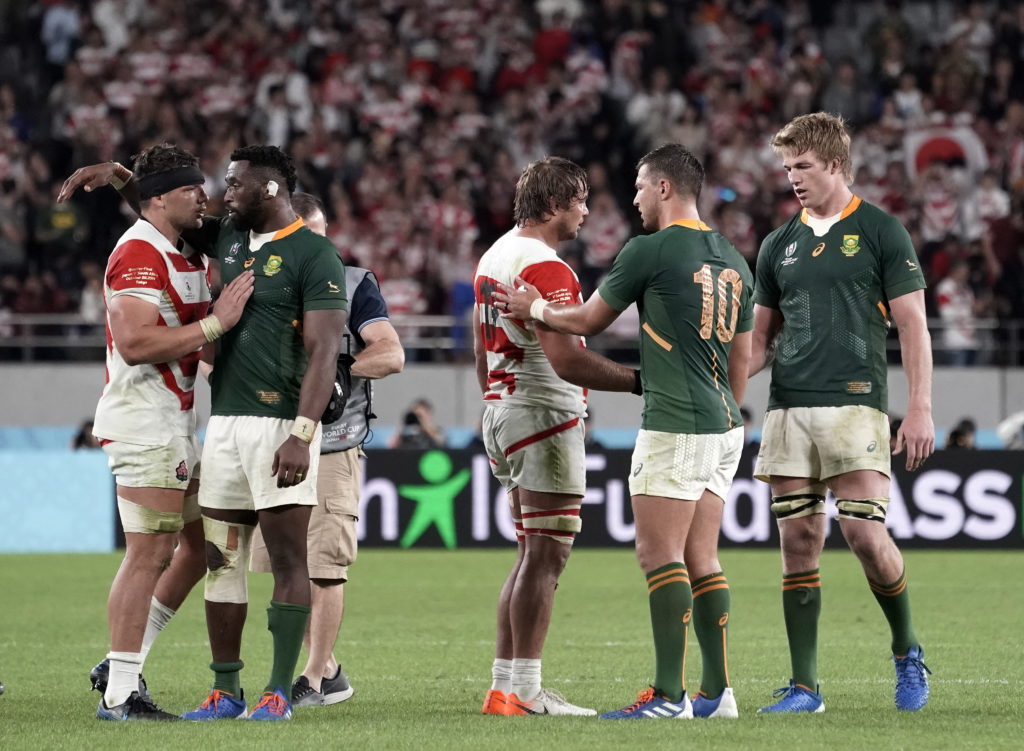SA Rugby magazine identifies some of the good, the bad and the ugly to take away from the Boks’ quarter-final victory over Japan.
The Good
While their offensive execution could certainly be improved upon, the Springboks’ set-piece dominance and defensive organisation have to be commended following their quarter-final victory over the hosts. The Bok forward pack’s ability to gain ascendancy over their opponents at scrum and lineout time, has certainly been one of the primary causes for their success thus far at the World Cup. The defensive cohesion by the squad as a whole has been another factor for the Boks’ run to a second successive World Cup semi-final. Rassie Erasmus’ side have now conceded the joint-fewest tries at the tournament (3), despite playing one match more than fellow last-four qualifiers England and New Zealand. The Boks managed to absorb the attacking pressure from the Brave Blossoms, who resorted to accelerating play at the set piece and using crosskicks out wide in an attempt to avoid the physical collisions. As expected, the brutal defence proved too much for Japan, who were forced into errors and unable to break a well-structured defensive line. The Boks bullied the Japanese at the contact point for most of the game, an encouraging sign as the players maintained their defensive intensity throughout. Having kept the high-flying Japanese try-less with desperate scramble defence, particularly during a tense first half, the Boks will take further confidence into next week after another assured defensive showing at the tournament.
READ: Ambitious Boks must be ruthless
The Bad
Again, the Bok offence, as has been the case for much of the campaign, showed the inability to convert attacking opportunities into points. This has undoubtedly encumbered the team’s game plan. While the Boks remain the top try-scoring nation at the World Cup – again having played one game more than other teams – they have certainly missed their fair share of chances throughout the tournament, including a handful during their win over Japan. What will be frustrating for the coaches, players and equally Bok fans, is that the team clearly works hard to achieve territory on the field through defensive pressure, yet they continue to cough up possession in attacking situations because of loose passes and poor decision-making. It has been a recurring theme where the Boks do well to secure possession and work their way into promising positions, before they lose their composure and promptly give possession back to their opponents. The Bok backline certainly needs to be more consistent in captalising on the solid platform set by the forwards, as a combined team effort is what will be required in Yokohama. The Boks will need to be more clinical to ensure they come away with the rewards of their effort against Wales, where missed opportunities are likely to cost them the chance of reaching a third World Cup final.
Duane: Wales will demand more of Boks
The Ugly
Although the fourth quarter-final was played in fairly good spirit, with the occasional scuffle, several officiating blunders fortunately did not influence the end result. There were instances early on when the hosts looked to stretch the Boks’ defensive line out wide, where several Japanese passes might have been adjudged as being forward by other match officials. Referee Wayne Barnes certainly did not receive much help from assistants Luke Pearce and Ben O’ Keefe, who were in better positions to make marginal calls. The ploy by Japan to restrict the Boks from competing for high balls was also something that might have been picked up on another day. The Bok wings were notably blocked off from retrieving possession during aerial challenges, with Japanese players strategically positioned between the players competing for the ball. There were other instances, again overlooked by the officials, where the hosts appeared to take a Bok player out in the air. While not deliberate, Kotaro Matsushima’s challenge on Makazole Mapimpi could have been considered reckless, but Barnes did not view it as foul play. In a tournament where TMO intervention has come under the spotlight, there was curiously no lengthy deliberation between Barnes and Rowan Kitt, despite replays clearly showing a penalisable offense. Here’s hoping that an officiating mishap does not influence the outcome of either semi-final this coming weekend.
Photo: EPA/Kimimasa Mayama





